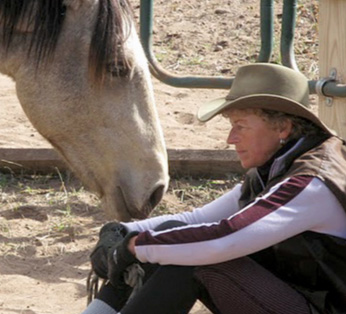BLM Announces Three Selections for National Wild Horse and Burro Advisory Board |
||
| The Bureau of Land Management announced today the selections for three open positions on its nine-member National Wild Horse and Burro Advisory Board. Ginger Kathrens of Fort Collins, Colorado, has been appointed for the category of humane advocacy; Ben Masters of Bozeman, Montana, has been appointed for the category of wildlife management; and Steven Yardley of Beaver, Utah, has been appointed for the category of livestock management. Each individual will serve a three-year term on the Advisory Board.Ms. Kathrens is the Founder and Executive Director of the Colorado-based Cloud Foundation, a non-profit organization dedicated to the preservation of wild horses on public lands. Kathrens is an Emmy award-winning creator of the acclaimed Public Broadcasting System series documenting the birth and life of a Pryor Mountains (Montana) wild stallion called “Cloud.” Her first Cloud film was voted the most popular documentary in the 25-year history of the Nature series on PBS. Kathrens is an honor graduate of Bowling Green State University and holds a Master of Art’s degree in Mass Communications from Florida State University.
Mr. Masters, founder and Chief Executive Officer of Fin & Fur Films, LLC is best known for his successful documentary Unbranded, an account of a 3,000-mile ride on wild horses that has raised awareness of the BLM’s adoption program and the myriad challenges facing public land managers. Masters holds a Bachelor of Science degree in Wildlife and Fisheries Sciences from Texas A&M University. Mr. Yardley, Vice President of Yardley Cattle Company, is a public land rancher and private landowner who holds grazing permits from the BLM and the U.S. Forest Service. A graduate of Southern Utah University, Yardley has been active with the Future Farmers of America, Utah Cattlemen’s Association, National Cattlemen’s Beef Association, and Southern Utah University’s Block and Bridle Club. Currently, Mr. Yardley serves as Vice President of the Western Rangelands Conservation Association. The National Wild Horse and Burro Advisory Board advises the BLM, an agency of the Interior Department, and the U.S. Forest Service, part of the Agriculture Department, on the management and protection of wild free-roaming horses and burros on public lands and national forests administered by those agencies, as mandated by the 1971 Wild Free-Roaming Horses and Burros Act. Members of the board, who represent various categories of interests, must have a demonstrated ability to analyze information, evaluate programs, identify problems, work collaboratively, and develop corrective actions. (Information about the board can be found at: http://www.blm.gov/wo/st/en/prog/whbprogram/Advisory_Board.html.) Among its current efforts to strengthen the Wild Horse and Burro Program, the BLM has been moving forward with a population-growth suppression strategy consistent with recommendations of a National Academy of Sciences study issued in June 2013. The agency’s new population growth-suppression research, representing an investment of approximately $11 million in 20 research projects over five years, will focus on (1) developing longer-lasting fertility-control agents; (2) evaluating the safety, feasibility, and effectiveness of spaying and neutering on-range wild horses; and (3) implementing better methods for estimating wild horse and burro populations. To achieve those aims, the BLM is working with the U.S. Geological Survey (USGS) and five universities — the University of Kentucky, Oregon State University, Colorado State University, Ohio State University, and Louisiana State University. Detailed information about each project has been posted on the agency’s Website (www.blm.gov).
|
||
| The BLM manages more than 245 million acres of public land, the most of any Federal agency. This land, known as the National System of Public Lands, is primarily located in 12 Western states, including Alaska. The BLM also administers 700 million acres of sub-surface mineral estate throughout the nation. The BLM’s mission is to manage and conserve the public lands for the use and enjoyment of present and future generations under our mandate of multiple-use and sustained yield. In Fiscal Year 2014, the BLM generated $5.2 billion in receipts from public lands. | ||






















































